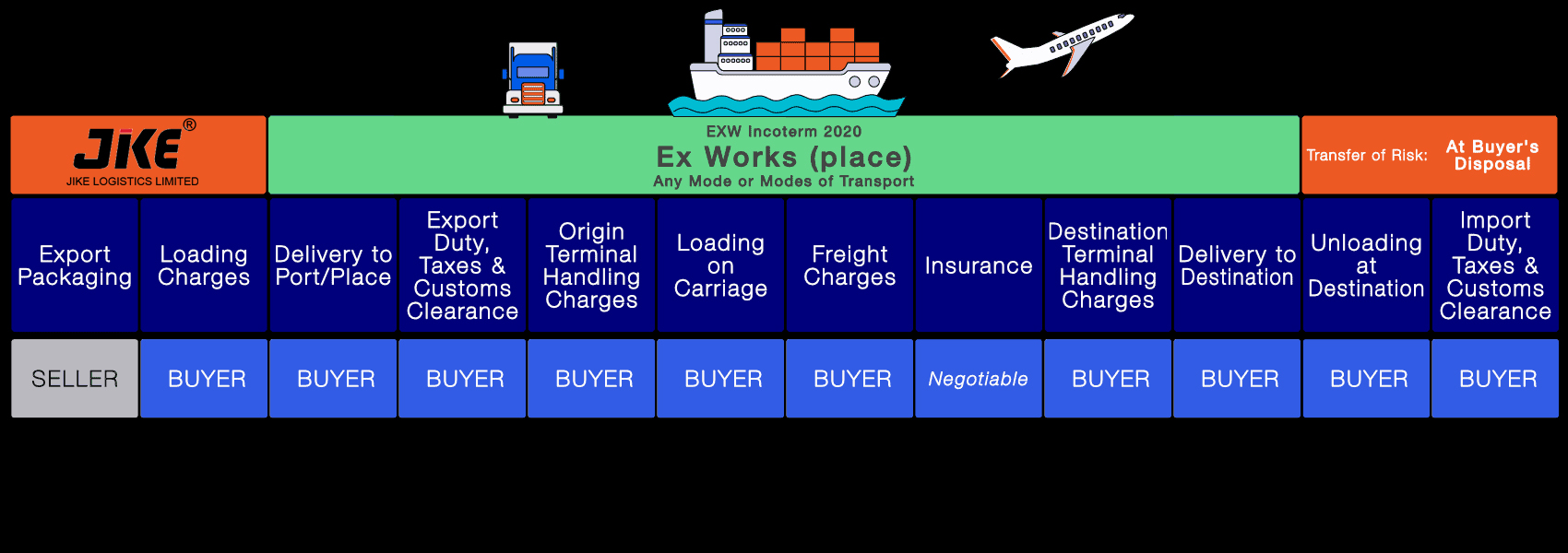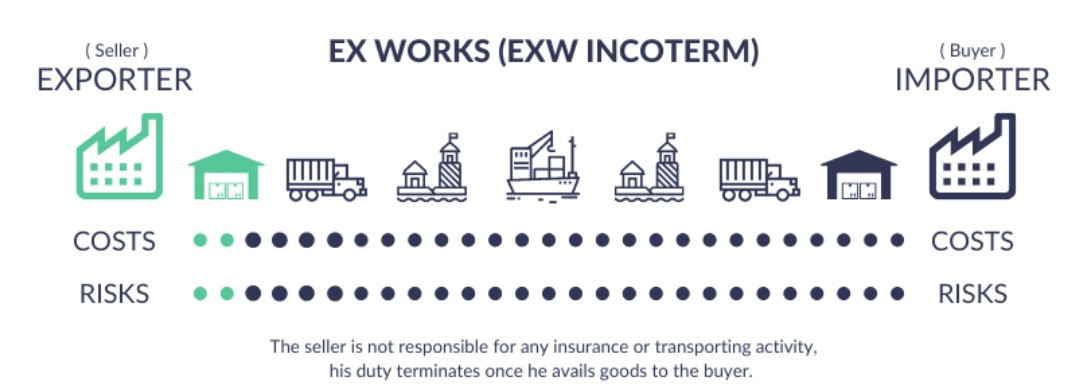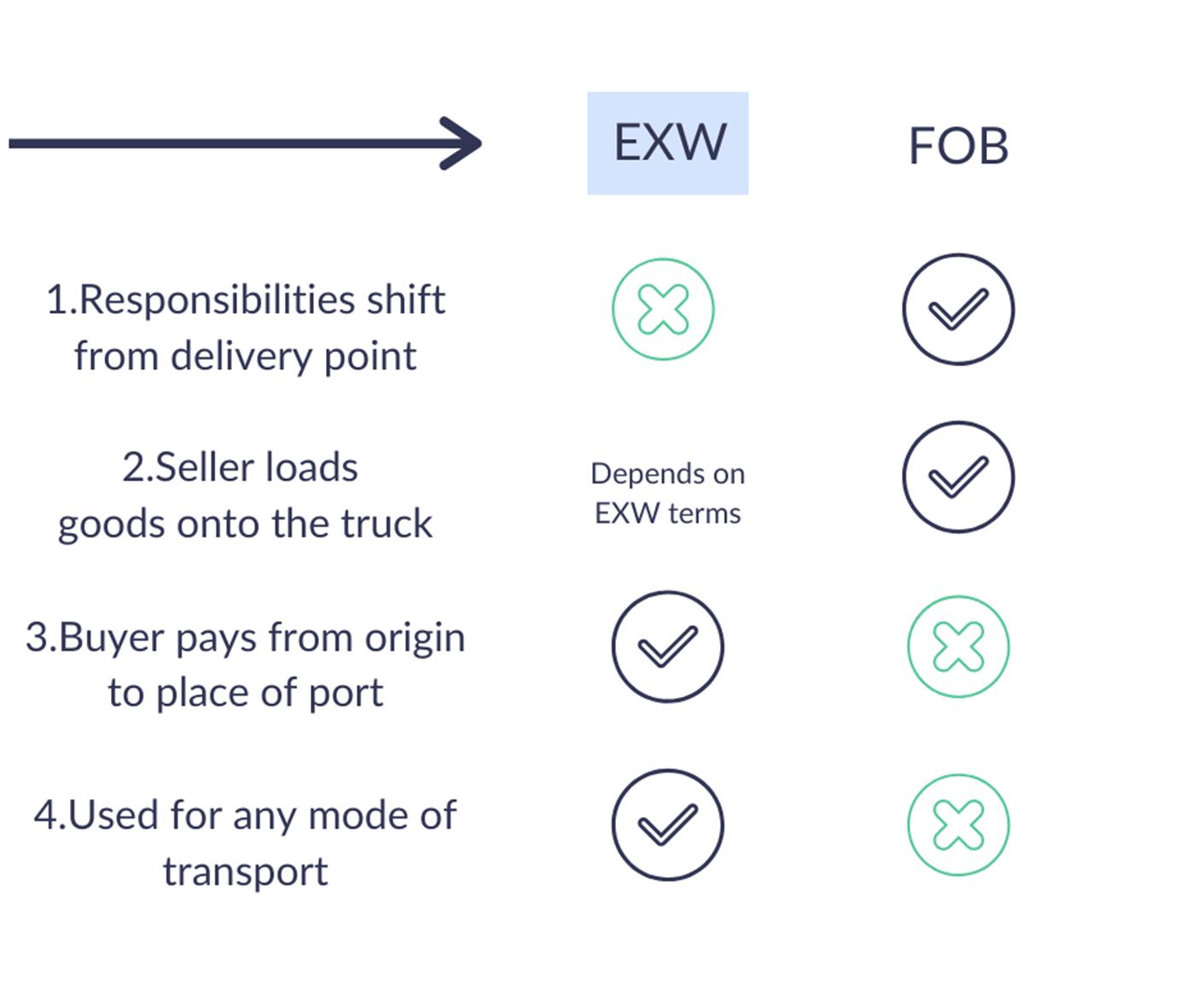This article provides a comprehensive overview of "Ex Works" (EXW) in international trade, including its definition, advantages, disadvantages, and when to use It also touches upon related Incoterms and practical considerations for both buyers and sellers.
What does EXW (Ex Works) mean?
EXW (Ex Works) Definition
EXW stands for Ex Works. Ex Works is an international trade term where the seller is responsible for preparing the goods for shipment. The buyer is responsible for shipping from the seller's warehouse to the destination.

Incoterm EXW
As one of the Incoterms (International Commercial Terms). These include various standardized international trade terms used worldwide. These "Terms" are established by the International Chamber of Commerce to provide clarity on various aspects, such as:
Time and place of delivery
Time of payment
When the risk of the goods is transferred
Who pays for freight costs and transport insurance
When using EXW or other Incoterms in a contract, it is important to explicitly state the applicable law in the contract. For example, one country may calculate import duties based on the CIF value of the goods, while another country may calculate these costs based on the FOB value of the goods. Any ambiguity can be avoided by specifying the applicable law in the contract.
Further Explanation of Ex Works (EXW)
Ex Works is highly advantageous for the selling party. The seller is only responsible for packaging the goods and making them available for transportation at the agreed location, typically the seller's warehouse. However, the selling party must assist the buyer in obtaining an export license or any other necessary documentation, all at the buyer's expense.
All risks and responsibilities are transferred to the buyer once the goods are made available to the buyer. It is the moment when the goods are loaded onto the transport vehicle arranged by the buyer.
If the seller assists in loading the goods onto the truck, the buyer is already responsible for any loading damage. At that point, both the risk and ownership have been transferred to the buyer.
When Incoterm Ex Works is Used
Ex Works is often used by companies placing large orders, such as filling an entire container or truck. In such cases, the buyer avoids paying a markup on transportation costs. For example, if the seller offers to transport the goods for €200 but the buyer believes they can arrange it for €150, it's more cost-effective for the buyer to arrange delivery Ex Works.
An EXW agreement should only be entered into when the buyer can assume all costs and risks associated with the transportation of the transaction. For instance, if you are ordering a very large order crucial to your business, it's wise to refrain from agreeing to Ex Works terms. If something happens during transportation, you will be responsible for the damage. In such cases, it's prudent to purchase transport insurance or consider other delivery terms, such as Free on Board (FOB).
Ex Works EXW – Incoterms® 2020 Rules
The Ex Works (EXW) term denotes the delivery of goods to a designated individual at the seller's place of business, typically a plant or warehouse.

Insight into Incoterms Ex Works
Ex-works (EXW), an Incoterms® 2020 rule, defines the shipment of goods from the seller's business location, usually at their plant, office, or storage facility. Initially, the buyer is not required to load the goods onto trucks, as the shipment's responsibility rests with the buyer. Incoterm EXW also offers advantages to sellers by deferring freight charges until goods depart their premises.
Pros and Cons for Buyers
Considering Incoterm EXW
For sellers, especially those dealing with letters of credit, EXW might not be ideal due to potential difficulties in meeting letter of credit requirements. In such cases, modifying terms and conditions may be necessary. For instance, if the buyer doesn't collect the goods within a specified timeframe or is uncertain about the export process, Incoterm EXW could lead to unexpected expenses. When a supplier insists on EXW incoterms, consider engaging a third-party logistics company or freight forwarder to assist with the export process.
When to Opt for an EXW Agreement
Businesses often choose Incoterm EXW agreements when the seller cannot export or when the buyer desires to consolidate multiple shipments under one name. EXW can also be advantageous for shipments by air express, as express courier companies typically handle collection and transport from the seller's location. This can result in cost savings.
Incoterm Ex Works Responsibilities and Risks
According to Incoterms 2020 rules, Incoterm EXW specifies that the buyer fulfill their obligations when the seller delivers the goods to the agreed-upon location, usually the seller's premises. The seller must correctly package the items, and the buyer takes charge of loading and transporting the goods to their final destination, typically at a later time. The risks and damages associated with the goods are transferred from the seller to the buyer as soon as they are delivered. In cases of damage during transport, the seller may assist the buyer in handling claims.
When your trade terms are Ex Works, feel free to choose Jike Logistics as your Chinese freight forwarding partner. We are dedicated to providing you with the most convenient logistics solutions, saving you both time and money. We can arrange door-to-door logistics services to ensure a smooth journey for your goods from the point of origin to the final destination. Regardless of the size of your shipment, we can deliver efficient service tailored to your needs. Choose Jike Logistics and let us be your trusted partner in international trade.
Exploring EXW in Shipping Terms
The EXW incoterm represents an agreement where the seller must make goods available to the buyer at their warehouse or specified location, placing maximum risk on the buyer. The buyer is responsible for transporting the goods to the destination port. Regardless of the mode and route of travel, Ex-works applies to all shipping types. Once the goods are loaded into the shipping container and collected, the seller's responsibility as the transporter ends.
EXW Shipping Terms | Buyer's Responsibilities
The importer's responsibilities are straightforward when exporting products from China under EXW shipping rules. Costs, arrangements, and liabilities fall on the importer. Solutions such as handling cargo transportation from the supplier to the final destination can be provided by entities like Jike Logistics, simplifying the process by including costs in an all-inclusive quotation when feasible.
Benefits of Incoterm Ex Works
Ex Works terms offer transparency in shipping costs, with the buyer bearing these costs directly. Buyers have full control over the transportation process, making it easier to monitor expenses. When goods are shipped to authorities, buyers have complete oversight. Additionally, buyers can maintain anonymity regarding their suppliers.
Incoterms 2020 Rule for Ex Works Significant Revisions and Updates
As shipments evolve, new challenges emerge. Buyers must clear products; only companies from specific countries can handle exports. Potential GST issues for sellers may arise, considering their role as exporters. Consequently, under Incoterm 2020, EXW becomes a less frequent choice.
What is the difference between FOB and Ex Works in incoterm?
EXW focuses on paying the shipping price for delivering shipments to specified locations. In contrast, FOB (Free on Board) transfers responsibilities to the buyer once the goods are loaded onto the vessel.

Understanding EXW Delivery
EXW signifies a supplementary contract wherein a seller pays for goods or services upon arriving at a designated delivery location. FOB, or Free on Board, immediately shifts responsibility to the buyer upon loading cargo onto the ship.
International Trade Terms: EXW
When opting for Ex Works terms, you commit to shipping goods from your location to the buyer's premises at your expense. The buyer assumes responsibility for loading the goods onto their transport and bears all associated risks and costs. This encompasses risks related to transit delays, damage or loss during transportation, and customs or import duties.
Choosing Ex-works
Incoterm Ex Works are typically suitable when experienced buyers aare involved and can handle the associated risks and costs. In cases where the buyer lacks experience or familiarity with importing, alternative Incoterms like FOB (Free on Board) might be a better choice. FOB transfers transport responsibility and associated risks and costs to the seller, providing added protection.
FAQ | Ex Works (EXW) Explained
These FAQ entries provide comprehensive information about Ex Works (EXW) and related shipping terms, covering responsibilities, risks, and key differences.
1. Who pays for shipping on EXW?
In an Ex Works (EXW) arrangement, the buyer is responsible for paying the shipping costs. The seller's responsibility ends once the goods are made available for pickup at their designated location.
2. What are EXW charges?
EXW charges typically refer to the costs associated with preparing and packaging goods for shipment in an Ex Works arrangement. These charges may include packaging, loading, and documentation fees, among others.
3. Does Ex Works include freight charges?
No, Ex Works does not include freight. The buyer is responsible for arranging and covering the cost of transportation from the seller's location to the final destination.
4. What is FOB terms?
FOB, which stands for "Free On Board," is another shipping term indicating the point at which the seller's responsibility for the goods ends and the buyer's responsibility begins.
5. Who pays for FOB shipping?
In FOB terms, the buyer typically pays for shipping costs from the port of departure to the final destination.
6. What does FOB stand for in shipping?
FOB in shipping stands for "Free On Board," indicating the point at which the seller's responsibility ends and the buyer's responsibility begins.
7. Is FOB seller the same as FOB shipping point?
Yes, FOB seller and FOB shipping point are often used interchangeably. Both imply that the seller's responsibility ends when the goods are delivered to the carrier at the shipping point.
8. What are the two types of FOB?
The two main types of FOB terms are "FOB Shipping Point" (seller's responsibility ends when the goods are shipped) and "FOB Destination" (seller's responsibility ends when the goods reach the buyer's destination).
9. What does FOB stand for on an invoice?
FOB on an invoice stands for "Free On Board" and indicates the point at which the seller's responsibility for the goods ends and the buyer's responsibility begins.
10. What is the FOB price?
The FOB (Free On Board) price includes the cost of goods, transportation to the port of departure, and loading onto the vessel marks the point at which the seller's responsibility ends in shipping.
11. What is the difference between Cost and Freight and Ex Works?
The key difference is that in Cost and Freight (CFR) terms, the seller is responsible for the cost of shipping to the destination port, whereas in Ex Works (EXW), the buyer bears all transportation expenses originating from the seller's location.
12. What is the difference between ex factory and Ex Works?
"Ex Factory" and "Ex Works" both refer to the point at which the seller's responsibility ends, but "Ex Factory" typically means the goods are made available at the seller's factory, while "Ex Works" is a more flexible term that allows for other agreed-upon locations
13. What is the difference between Ex Works and Free Carrier?
The main difference is that under Ex Works, the seller's responsibility ends when the goods are made available at a specified location contrast, the Free Carrier (FCA) term entails the seller handing over the goods to a carrier selected by the buyer.
14. What is the difference between Ex Works and Free Carrier?
The main difference is that under Ex Works, the seller's responsibility ends when the goods are made available at a specified location contrast, the Free Carrier (FCA) term entails the seller handing over the goods to a carrier selected by the buyer.
15.What is the difference between Ex Works and CIF in incoterm?
The main difference is that in Ex Works, the buyer is responsible for all transportation costs and risks, while in CIF, the seller is responsible for transportation to the port of destination and insurance.
16. What is an example of Ex Works?
An example of Ex Works could be a seller in China making goods available at their warehouse and a buyer in the United States arranging for transportation and covering all associated costs from the seller's warehouse to the Destination.
17. Who pays for Ex-works?
In an Ex Works (EXW) arrangement, the buyer pays for all transportation costs, including shipping, handling, and customs duties, from the seller's location to the final destination.
18. What is the title Ex Works?
The title "Ex Works" refers to one of the Incoterms (International Commercial Terms) used in international trade to define the point at which the seller's obligations end and the buyer's obligations begin.
19. How do you calculate Ex Works?
Ex Works is not calculated but rather defined by agreement between the buyer and seller, specifying the location where the seller's responsibilities for the goods end.
20. Is Ex Works prepaid?
Ex Works is typically not prepaid. The buyer arranges and pays for transportation costs independently.
21. Does Ex Works still exist?
Yes, Ex-works (EXW) is still a widely used Incoterm in international trade.
22. What are the risks of Ex-works?
The risks of Ex-works include potential damage or loss of goods during transportation, customs clearance issues, and the buyer's responsibility for coordinating and covering all transportation costs.
23. What are the rules for Ex Works?
The rules for Ex Works are defined by the Incoterms 2020, which specify the obligations of both the buyer and seller in an Ex Works arrangement.
24.What is the seller obligation for Ex Works?
The seller's obligations for Ex Works include preparing the goods for shipment, making them available at the agreed location, and assisting the buyer with export documentation.
25. What is the Ex Works charge?
The Ex-works charge generally encompasses the fees associated with preparing and packaging goods for shipment, which are the responsibility of the buyer in an Ex Works arrangement.
26. What documents are required for Ex Works?
The specific documents required for Ex Works may vary, but they typically include the commercial invoice, packing list, export license (if applicable), and any other documentation needed for customs clearance.
27. What is the date for Ex Works?
The date for Ex Works is determined by the agreement between the buyer and seller and is specified in their contract.
28. Where is Ex Works?
Ex Works can be at any mutually agreed location, typically the seller's warehouse or another specified point.
29. Does Ex Works include insurance?
No, Ex Works does not include insurance. It is the buyer's responsibility to arrange for insurance coverage if desired.
30. Why is it called Ex Works?
The term "Ex Works" is used to indicate that the seller's obligations for the goods end at their specified location, and it is one of the internationally recognized Incoterms.
31. What are the duties of Ex Works?
The duties of Ex Works involve the seller's responsibilities for preparing and packaging goods, making them available for pickup, and assisting with export documentation. The buyer assumes transportation and customs duties.
32. Does EXW include packaging?
Ex Works ( Incoterm EXW) generally includes the seller's responsibility for packaging and preparing the goods for shipment, but the specific details should be agreed upon in the contract.
If you have any questions or need further clarification about Ex Works terms, please get in touch with JIKE. We are here to assist you!
Related Articles
View all articles
Complete Guide on shipping to Belgium and Amazon FBA Belgium Shipping
It will guide you on shipping to Belgium from China. Jike is a professional freight forwarder in Amazon FBA Belgium shipping, sea freight and air freight.
18 August 2023

Shipping from China to Sweden | Heavy Freight Shipping and Custom Clearance Sweden
This article guides you through how shipping from China to Sweden works and offer first-class solutions for heavy freight shipping by sea, air, and railway.
11 August 2023

Shipping From China To Romania :Air, Sea, Rail,Best Rates
Best door-to-door shipping guide from China to Romania. Amazon delivery to Romania available! Contact us now to obtain a free quote for shipping to Romania!
11 August 2023


Consult Our Experts